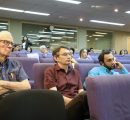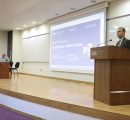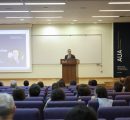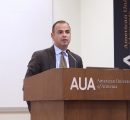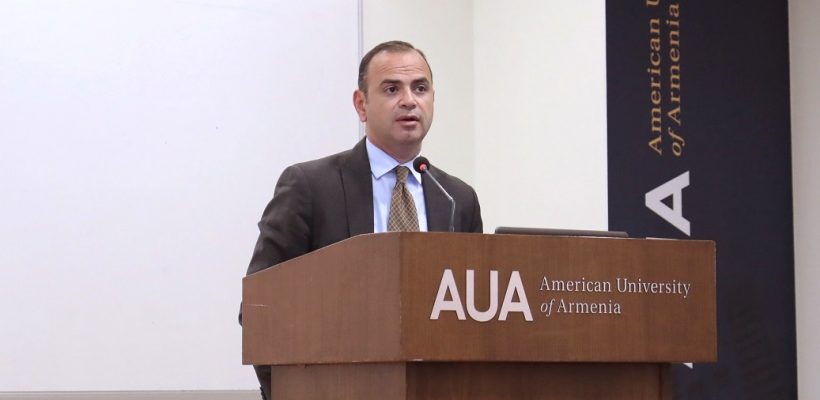
Zareh Sinanyan Discusses the Concept of Small State, Global Nation at AUA
3 min readYEREVAN, Armenia – On September 5, 2019, the American University of Armenia (AUA) Political Science and International Affairs (PSIA) program held the second seminar on small states studies following the inaugural workshop on April 30. The speaker of the event was Zareh Sinanyan, High Commissioner for Diaspora Affairs of the Republic of Armenia (RA), who discussed the concept of Small State, Global Nation. The event was moderated by AUA Adjunct Lecturer, Coordinator of the Initiative for Small States Studies (ISSS) Dr. Narek Mkrtchyan.
In his opening remarks, PSIA Program Chair Associate Professor Dr. Vahram Ter-Matevosyan presented relations with the Diaspora as an important topic that has stayed on Armenia’s national agenda in the last three decades. The appointment of the High Commissioner for Diaspora Affairs restructured the former Ministry of Diaspora into an organization that brought a wave of new expectations from some circles of the Diaspora. Dr. Ter-Matevosyan raised a set of questions on how well Armenia’s political, economic and social problems are known in the Armenian diaspora; what diaspora means; whether Armenia-Diaspora relations are being discussed from the right standpoint, and whether it is possible to prognosticate the future of the relationship. He then introduced and welcomed the speaker as well as the moderator of the event.
Dr. Mkrtchyan noted that the Initiative for Small States Studies started with the University of Iceland where one of the prominent centers in the field is located. The great idea behind small states studies in Armenia is conceptualizing the smallness of Armenia. The Diaspora is one of the four research directions of ISSS along with high technologies, institutions, and security. Dr. Mkrtchyan then gave the floor to Sinanyan to discuss the term small state, global nation which is often used in reference to Armenia and the Armenian Diaspora.
According to the speaker, the state of Armenia is the pivotal component of Armenia-Diaspora relations without which the Diaspora cannot survive. He then compared Armenia with the sun around which the Diasporan communities revolve. However, the state is yet to present the magnetic strength to attract the communities to it, and in turn, each Diasporan community will need to strive to be associated with Armenia and strengthen its identity with ethnicity.
Sinanyan highlighted the importance of repatriation while recalling the lessons learned from previous repatriations: what can be done to avoid the previous mistakes and what preconditions should be created to secure measurable repatriation. During the presentation the speaker addressed questions related to the optimal use of resources of Armenia and the Diaspora to build a truly global nation, and how to vest the resources of the Armenian Diaspora into strengthening the homeland as well as the communities of the Diaspora. His emphasis was on shifting to an Armenia-centric global identity while preserving and strengthening Diaspora communities. In conclusion, Sinanyan spoke about the key issues planned for discussion at the three upcoming conferences that the office of the High Commissioner for Diaspora Affairs will hold next year.
The presentation was followed by a Q&A session, during which the audience had the opportunity to ask questions on the challenges and issues that the Armenian communities are facing, the challenges that the office of the High Commissioner for Diaspora Affairs is encountering, the preservation of Western Armenian as a coexisting language along with Eastern Armenian.
The video recording of the event is available here.
The Political Science and International Affairs (PSIA) program of the American University of Armenia (AUA) equips students with advanced analytical reasoning, critical thinking, and communication skills through the study of political science and international affairs, emphasizing local and global perspectives and practical applications of theory. The program provides world-class teaching and research, producing graduates who can best contribute to the development of the nation.

